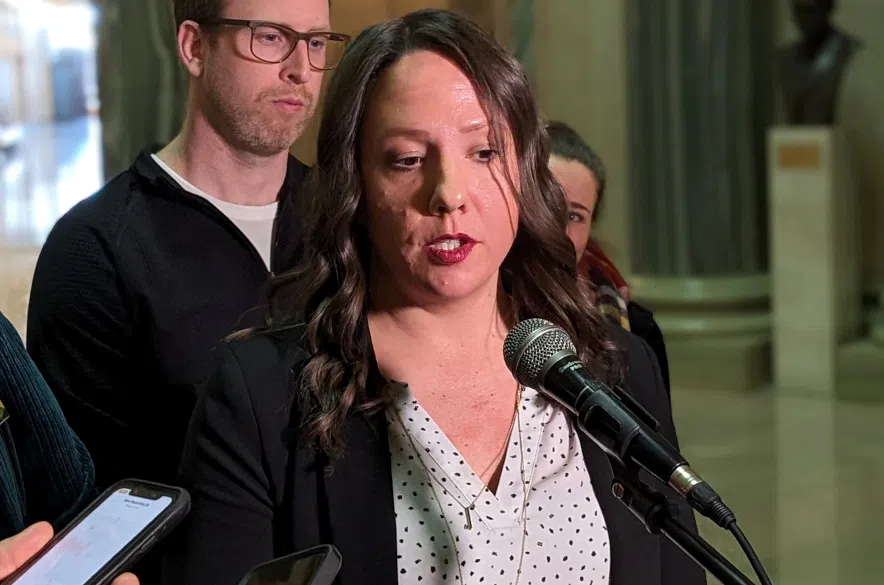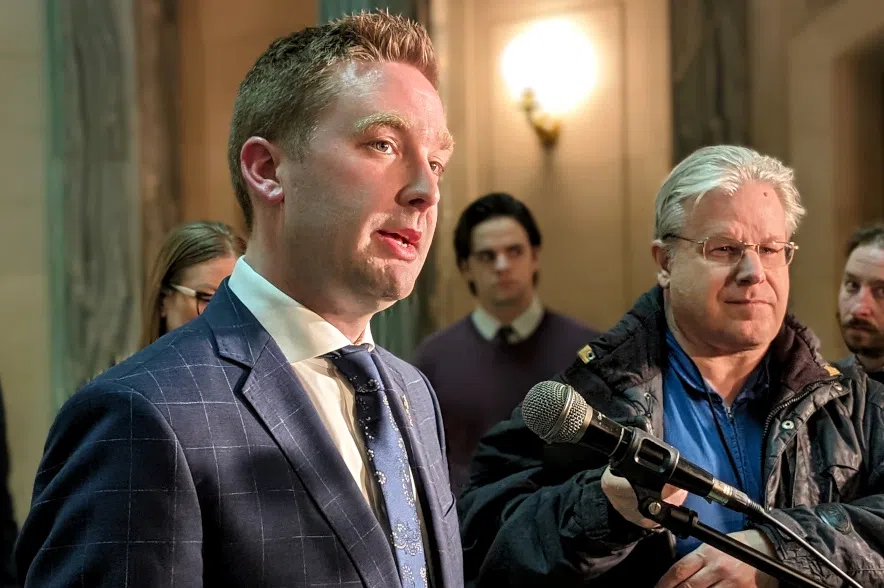As sanctions levied by the Saskatchewan Teachers’ Federation affect extracurriculars this week, there could be a chance teachers and the province will meet at the bargaining table again soon.
STF president Samantha Becotte told Evan Bray Show guest host Taylor MacPherson on Monday that the teachers are willing to get back to the table if the province presents a “tangible” and “sufficient” offer.
Last week, a $3.3-billion investment in education was announced in the provincial budget. That includes a funding agreement between the government and Saskatchewan School Boards Association that guarantees a base amount of $356.6 million for classroom support over the next four years for class size and classroom complexity.
On Friday, Education Minister Jeremy Cockrill said the province is looking at preparing an accountability framework connected to the funding agreement.
Becotte told MacPherson that, with a couple of changes and amendments, she would be happy to see that put into a new collective bargaining agreement.
“I’m cautiously optimistic of what this could mean and I’m hopeful that we’re able to resolve the dispute and finish out our bargaining,” said Becotte, who noted she spoke with Cockrill on Friday afternoon to discuss his statement.
The federation president said the STF wants to make sure the school boards are accountable for the decisions they make regarding the funding, that the funds are guaranteed over the course of the contract, and that the money is indexed to inflation and enrolment growth.
However, on Monday, Cockrill couldn’t give any details on what an accountability framework would entail.
“There’s ongoing discussions around that in terms of the details of what that exactly looks like,” Cockrill told reporters at the Legislative Building.
“Wherever we land with it, I do think it’ll be an opportunity for there to be teacher voice and further accountability and transparency on how school divisions allocate dollars and resources in their respective communities.”
Cockrill said his ministry is working on the framework internally and, as of Monday afternoon, there hadn’t been any collaboration on the shape of it between government and teachers.
Despite the apparent progress, Becotte said all of the funding proposed by the government isn’t enough.
“We’ve been talking about the $400-million gap in education that was created over the last decade (and) essentially, we still need over $250 million,” she said.
“Now, that said, this is a step forward, but we need to see that continued investment above the rate of enrolment and above the rate of inflation to start filling the gap that has been created due to underfunding over the last decade.”
Class size and classroom complexity remain the focal point of bargaining conversations, but compensation will also be brought up at the table as talks resume, she explained.
“Until we can have progress on (classroom complexity), then we really can’t get to the other conversations,” she said. “But I do believe that we are closer to an agreement and we’d likely get to an agreement relatively quickly once we’re able to resolve what classroom complexity is going to look like in the bargaining context.”
Currently there aren’t any bargaining meetings set between the teachers’ federation and the province this week. The STF has said it won’t resume negotiations until the government agrees to put class size and classroom complexity into the new collective bargaining agreement.
During the dispute, teachers have staged rotating strikes, withhold lunch-hour supervision and withdrawn supervision of extracurriculars. That has affected a number of events, including Hoopla.
Instead of a three-day tournament, the provincial high school basketball championships were held over the course of one day in Moose Jaw.
Cockrill also said Friday that the government was looking at how it could make sure students have access to the opportunities they should, including graduation. However, on Monday, he again didn’t provide any details.
He said the government is looking at its options and he has been having discussions with school boards, but he declined to say what those options might be.
“Obviously, all these graduates are going to move on to bigger and better things in their life, and that’s exciting for them. But when you’re that age and you’re looking forward to your graduation, it’s a big deal, and it’s a big deal to families as well,” said Cockrill.
Becotte said the sides should have been able to come to an agreement over the 15 days of negotiations they had between May and December to avoid the sanctions, but she said the Government-Trustee Bargaining Committee didn’t want to address the issue of class size and classroom complexity.
“While we’re hopeful that we’re able to find a path forward now, it is disappointing that this couldn’t have happened six months ago,” Becotte said. “It would have prevented any of the actions or any of the disruptions that teachers have had to take through our sanction actions.”
The NDP’s education critic, Matt Love, appears skeptical of Cockrill after his answers Monday, saying the lack of details shows that Cockrill doesn’t actually have any answers and only seems to know the words “accountability framework.”
“Teachers have been fleeced in the past and have every reasons to want to see commitments signed in a contract,” said Love.
On the topic of high school graduations, Love said no one wants to see those things impacted and said the minister has a responsibility to either get a deal done or get out of the way.
— With files from 980 CJME’s Lisa Schick












